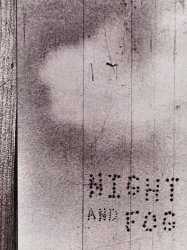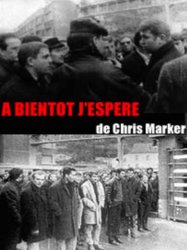Statues Also Die is a french film of genre Documentary directed by Chris Marker with Jean Négroni
Statues Also Die (1953)
Statues also Die

If you like this film, let us know!
Length 30minutes
OriginFrance
Genres Documentary
Themes Films set in Africa, Films about racism, Documentary films about racism, Documentary films about law, Documentary films about historical events, Documentary films about politics, Political films
Rating74%










Statues Also Die (French: Les statues meurent aussi) is a 1953 French essay film directed by Chris Marker and Alain Resnais, about historical African art and the effects colonialism has had on how it is perceived. The film won the 1954 Prix Jean Vigo. Because of its criticism of colonialism, the second half of the film was censored in France until the 1960s.
Synopsis
The film exhibits a series of sculptures, masks and other traditional art from Sub-Saharan Africa. The images are frequently set to music and cut to the music's pace. The narrator focuses on the emotional qualities of the objects, and discusses the perception of African sculptures from a historical and contemporary European perspective. Only occasionally does the film provide the geographical origin, time period or other contextual information about the objects. The idea of a dead statue is explained as a statue which has lost its original significance and become reduced to a museum object, similarly to a dead person who can be found in history books. Interweaved with the objects are a few scenes of Africans performing traditional music and dances, as well as the death of a disemboweled gorilla.Actors

Jean Négroni
(Narrator (voice))
Comments
Leave comment :
Suggestions of similar film to Statues Also Die
There are 13 films with the same actors, 67 films with the same director, 8965 with the same cinematographic genres, 9766 films with the same themes (including 22 films with the same 7 themes than Statues Also Die), to have finally 70 suggestions of similar films.If you liked Statues Also Die, you will probably like those similar films :

Night and Fog (1959)
, 32minutesDirected by Alain Resnais
Origin France
Genres War, Documentary, Historical
Themes Films about racism, Films about religion, Documentary films about racism, Documentary films about law, Documentary films about war, Documentary films about historical events, Documentaire sur une personnalité, Documentary films about religion, Political films, Films about Jews and Judaism, Documentary films about World War II
Actors Michel Bouquet
Rating85%





Night and Fog is a documentary that alternates between past and present and features both black-and-white and color footage. The first part of Night and Fog shows remnants of Auschwitz while the narrator Michel Bouquet describes the rise of Nazi ideology. The film continues with comparisons of the life of the Schutzstaffel to the starving prisoners in the camps. Bouquet then addresses the sadism inflicted upon the doomed inmates, including torture, scientific and medical "experiments", executions, and prostitution. The next section is shown completely in black-and-white, and depicts images of gas chambers and piles of bodies. The final topic of the film depicts the liberation of the country, the discovery of the horror of the camps, and the questioning of who was responsible for them.

Far from Vietnam (1967)
, 1h56Directed by Claude Lelouch, Chris Marker, Alain Resnais, Joris Ivens, Jean-Luc Godard, Agnès Varda, William Klein
Origin France
Genres Drama, War, Documentary
Themes French war films, Politique, Documentary films about war, Documentary films about historical events, Political films
Actors Bernard Fresson, Karen Blanguernon, Jean-Luc Godard, Maurice Garrel, Marie-France Mignal, Agnès Varda
Rating72%





Sept façons différentes de présenter les armées nord-vietnamiennes en pleine guerre contre les Etats-Unis. Un conflit opposant les riches aux pauvres sur fond d'indignation ou parfois d'indifférence de la part de l'opinion publique mondiale.

A Grin Without a Cat (1977)
, 4hDirected by Chris Marker
Origin France
Genres War, Documentary, Historical
Themes Politique, Documentary films about politics, Political films
Actors Yves Montand, François Périer, Jorge Semprún, Simone Signoret
Rating78%





The film features many interviews with French communist leaders, students, and sociologists. The Prague Spring of 1968 is featured, with footage of a Fidel Castro speech in which he explains his political support for the Soviet invasion of Czechoslovakia while questioning the legality of the action. Other sections deal with the rise of Salvador Allende, Minamata poisoning in Japan, and the Watergate Scandal in the US. There are many subtle references to cats throughout the film, as well as brief shots of raccoons.

Be Seeing You (1968)
, 43minutesDirected by Chris Marker
Origin France
Genres Documentary
Themes Films about the labor movement, Documentary films about politics, Documentaire sur le monde du travail, Political films
Rating68%





Le film relate la grève dans l'usine de textiles Rhodiacéta de Besançon, en mars 1967, au travers des témoignages des ouvriers sur leurs conditions de travail et motivations. Cette grève a pris un aspect particulier de par l'assimilation du plan culturel du plan social : les revendications ne tournent plus seulement autour de l'entreprise (salaires ou sécurité de l’emploi), mais aussi sur le mode de vie que la société imposait notamment à la classe ouvrière. Les ouvriers grévistes qui occupent l'usine ont à leur disposition du matériel pour filmer les événements, grâce à Chris Marker, Jean-Luc Godard ainsi que Bruno Muel. Comme le Mai rampant italien, cette grève est une sorte d'avant-coureur de la vague de fond de mai 68.

Sans Soleil (1983)
, 1h40Directed by Chris Marker
Origin France
Genres Science fiction, Documentary
Themes Films set in Africa, Seafaring films, Transport films
Actors Florence Delay, Arielle Dombasle, Kim Novak, James Stewart, Charlotte Kerr, Alexandra Stewart
Rating76%





Le film est construit autour du discours d'un cameraman fictif, Sandor Krasna, rédacteur de lettres lues tout au long du film par Florence Delay. Dans ses écrits, il va traiter successivement du temps, de la mémoire, de la fragilité humaine face aux séismes du Japon ou encore face à la famine, menace constante au Cap Vert ou en Guinée-Bissau. Le cinéaste voyage alors aux « deux pôles extrêmes de la survie » tel qu'il le dit lui-même. Il montrera non pas les difficultés pour ces sociétés à s'en sortir, mais plutôt leur façon de vivre et d'exister au-delà de ce qui peut leur coûter la vie. Car comme il l'annonce : « Moi, ce que je veux vous montrer, ce sont les fêtes de quartier ».

Level Five (1997)
, 1h46Directed by Chris Marker
Origin France
Genres Science fiction, War, Documentary, Romance
Themes Films about computing, Jeu, Documentary films about war, Documentary films about historical events, Films about video games, Cyberpunk films, Anticipation
Actors Catherine Belkhodja, Chris Marker, Nagisa Ōshima
Rating69%





Kenji Tokitsu, expert en sports de combat et auteur de la Voix du do, et Nagisa Oshima, cinéaste, sont interviewés. (partie documentaire du film).

La Jetée (1962)
, 28minutesDirected by Chris Marker
Origin France
Genres Science fiction, Fantastic, Romance
Themes Post-apocalyptic films, Films about religion, Transport films, Time travel films, Transport en Île-de-France, Films set in the future, Political films, Dystopian films, Alternate history films, Arme nucléaire, Disaster films, Photographie
Actors Jean Négroni, Hélène Châtelain, William Klein, André Heinrich, Ligia Branice
Rating81%





A man (Davos Hanich) is a prisoner in the aftermath of World War III in post-apocalyptic Paris where survivors live underground in the Palais de Chaillot galleries. Scientists research time travel, hoping to send test subjects to different time periods "to call past and future to the rescue of the present". They have difficulty finding subjects who can mentally withstand the shock of time travel. The scientists eventually settle upon the prisoner; his key to the past is a vague but obsessive memory from his pre-war childhood of a woman (Hélène Chatelain) he had seen on the observation platform ("the jetty") at Orly Airport shortly before witnessing a startling incident there. He had not understood exactly what happened but knew he had seen a man die.

Directed by Chris Marker
Genres Documentary
Themes Politique, Political films
Rating71%





Le 21 octobre 1967 à Washington, la jeunesse américaine organise une marche pacifique sur le Pentagone en opposition à la guerre du Vietnam.

The War Is Over (1966)
, 2h1Directed by Alain Resnais
Origin France
Genres Drama, War, Thriller
Themes Political films
Actors Yves Montand, Ingrid Thulin, Geneviève Bujold, Michel Piccoli, Jean Dasté, Dominique Rozan
Rating72%





In the aftermath of the Spanish Civil War, the communist veteran Diego (Yves Montand) has dedicated his life to continuing the struggle against the Franco regime while living in exile in Paris. Lately, however, he has become war-weary and skeptical about the tactics of the revolutionary underground. After meeting Nadine (Geneviève Bujold), whose father's passport he is using, he learns that she is involved with an alternative revolutionary group that is planning an armed attack in Spain. When he meets the young revolutionaries who will execute the plan, he tries to persuade them to abandon the action as misconceived, but they ignore him. The leaders of the underground, meanwhile, send Diego on a mission to Barcelona along with a new recruit, perhaps as a way of getting rid of him; the police have since discovered his identity. His lover Marianne (Ingrid Thulin), who has received a warning from Nadine, attempts to intercept him before he is arrested.

The Year 01 (1973)
, 1h27Directed by Jacques Doillon, Alain Resnais, Jean Rouch
Origin France
Genres Comedy, Action
Themes Films about anarchism, Politique, Political films, Histoire de France
Actors Daniel Auteuil, Josiane Balasko, Romain Bouteille, Isabelle de Botton, Madeleine Bouchez, Christian Clavier
Rating62%





The film narrates a utopian abandonment, consensual and festive of the market economy and high productivity. The population decides on a number of resolutions beginning with "We stop everything" and the second "After a total downtime will be revived—reluctantly—that the services and products including lack will prove intolerable. Probably: water to drink, electricity for reading at night, the TSF to say "This is not the end of the world, this is an 01, and now a page of Celestial Mechanics". The implementation of these resolutions is the first day of a new era, Year 01. The Year 01 is emblematic of the challenge of the 1970s and covers such diverse topics as ecology, negation of authority, free love, communal living, rejection of private property and labor.
 Connection
Connection